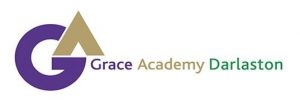KS3 Curriculum Intent
It is the aim of the KS3 drama curriculum to create thoughtful, kind and empathetic young people who enjoy and excel being creative. The curriculum will provide pupils with the knowledge to participate in arts and culture, through gaining an understanding of the skills and techniques needed to create performance work. In addition, collaborative experiences will develop their interpersonal, communication and co-operation skills in line with our school values of Grace, Respect, Integrity, Potential and Excellence.
Year 7
Year 7 sets the foundation for future study by embedding key knowledge and skills that will permeate future learning in this subject as well as others. Pupils begin their learning journey by learning to co-operate with others and develop their oracy and negotiation skills, vital components of most aspects of life. Their curriculum begins with developing these key skills through the introduction of physical theatre techniques then sequencing on to performance skills within scripted drama by studying Goodnight Mr Tom where pupils explore language, character and the conventions of a play script.
From developing a foundation of co-operation and performance skills, pupils move on to learning techniques to devise and structure their own dramas, by exploring the mystery of The Missing Girl, and using exploratory strategies to gain empathy and deep understanding of the issues involved in The Gresford Mining Disaster. Putting pupils in role as specific characters with backstories and current experiences helps to deepen their empathy for people who are different to themselves.
The sequencing of the curriculum allows for pupils to deepen their understanding of different topics and genres of drama, giving them confidence in their own voice as well as the tools to access and participate in art and culture.

Useful websites for revision and additional support:
https://www.bbc.co.uk/bitesize/articles/z4j32sg
https://www.bbc.co.uk/teach/school-radio/english-ks2-oliver-twist-index/zmcpmfr
Year 8
In the first term of year 8, pupils retrieve and then deepen their understanding of devising and performance skills by creating original drama on J’s Story, and then learning key principles of Greek Theatre including working as a chorus. These skills then thread through Musical Theatre, developing their discipline and extending their understanding of the techniques of timing and accuracy, that are required to perform in professional repertoire. After developing choreography and movement skills, pupils gain deeper understanding of the importance of co-operation and working accurately when they work on Theatre in Education, an enquiry-led topic designed to give students ownership of their learning. By continually revisiting and extending the skills learned in year 7, pupils are equipped to access a KS4 curriculum with breadth and depth that challenges students to use skills and techniques to a more advanced standard.

Useful websites for revision and additional support:
https://www.bbc.co.uk/bitesize/topics/z37mn39
https://www.rsc.org.uk/the-tempest/learning
KS4 Curriculum Intent
Exam board and course title: Eduqas GCSE Drama
Method of assessment:
Component 1: Devising Theatre Non-exam assessment: internally assessed, externally moderated 40% of qualification
Component 2: Performing from a Text Non-exam assessment: externally assessed by a visiting examiner 20% of qualification
Component 3: Interpreting Theatre Written examination: 1 hour 30 minutes 40% of qualification

Useful websites for revision and additional support:
https://www.bbc.co.uk/bitesize/topics/zwpfvwx/articles/z67bcmn
https://www.bbc.co.uk/bitesize/articles/zkw8kmn
https://dramaresource.com/devising-theatre/
https://resource.download.wjec.co.uk/vtc/2021-22/wjec21-22_1-2/batch-b-pdf/noughts-and-crosses.pdf
It is the aim of BTEC Performing Arts to study three pieces of repertoire through research and practical development, gaining in-depth knowledge about the processes and approaches involved in creating professional performance work, from work that begins life as a script (we have previously studied, Everybody’s Talking About Jamie, The Crucible, A Taste of Honey, Shakers, Layla’s Room, Promise, Blood Brothers and Things I know to be True) to work that is created through interviewing real people (Verbatim) such as The Laramie Project and Too Much Punch for Judy. The learning journey is ambitious and enquiry-based with year 10 pupils researching and learning about the roles, responsibilities and skills needed to work in the Performing Arts. Their work will mirror professionals by participating in the creative processes and applying those performance skills and techniques in performances. Pupils develop and apply fluency in written skills by researching and writing in detail about productions created with differing stylistic features as well as documenting their own development of skills, techniques and their contribution to the creative process. Year 10 culminates in developing a refined group performance that requires them to apply knowledge and skills acquired throughout the year. They must select and perform an extract from an existing piece of repertoire, participating in the full development and rehearsal process, as though part of a professional company.
The two-year curriculum is synoptic, requiring students to build knowledge and expand on their research and study of repertoire in depth, by demonstrating the stylistic features of practitioners’ work from which they have been influenced. In year 11, pupils must apply this knowledge to the creation of a workshop performance in response to an exam board released Brief, as well as document the process from the inception of ideas, to the application of skills and techniques and a post-performance evaluation.
A small group of students who have been identified as needing an individually graduated approach to working in this subject, broadly follow the same schemes of work as the other classes in year 7, but have their needs met by focussing on literacy, oracy and taking turns. When working on physical theatre, students develop their oracy and co-operation skills and learn to listen to others, and when working on ‘Goodnight Mr Tom’ students build their knowledge of the written word, to the spoken word and ways these used to create characters and visual performances. These skills are revisited throughout the year embedding key knowledge that the students need to be able to access the year 8 curriculum. Drama will ensure the curriculum prepares students for KS3, GCSE, post-16 and higher education and employment opportunities in an accessible format.

